LIBS1035: Article Review on the Effect of Global Warming on Oceans
VerifiedAdded on 2023/01/13
|9
|1672
|37
Report
AI Summary
This report is an article review focusing on the effects of global warming on oceans, specifically ocean warming. It begins with an introduction to the concept of global warming and ocean warming, explaining the role of greenhouse gas emissions and the absorption of excess heat by oceans. The report then details the impacts of ocean warming on marine species, ecosystems, and human activities, including coral bleaching, damage to breeding grounds, and threats to global food security. The review analyzes articles by Wernberg, Nace, Shukla, and Sleget, highlighting the urgency of restricting greenhouse gas emissions, re-establishing coastal and marine ecosystems, and cultivating human adaptation. It emphasizes the need for increased scientific research to monitor ocean warming and its effects, concluding with a call for action to mitigate the adverse consequences of global warming on the oceans. The report also provides suggestions for mitigating these effects, such as restricting greenhouse gas emissions, re-establishing coastal and marine ecosystems, cultivating human adaptation, and further strengthening scientific research on ocean science.
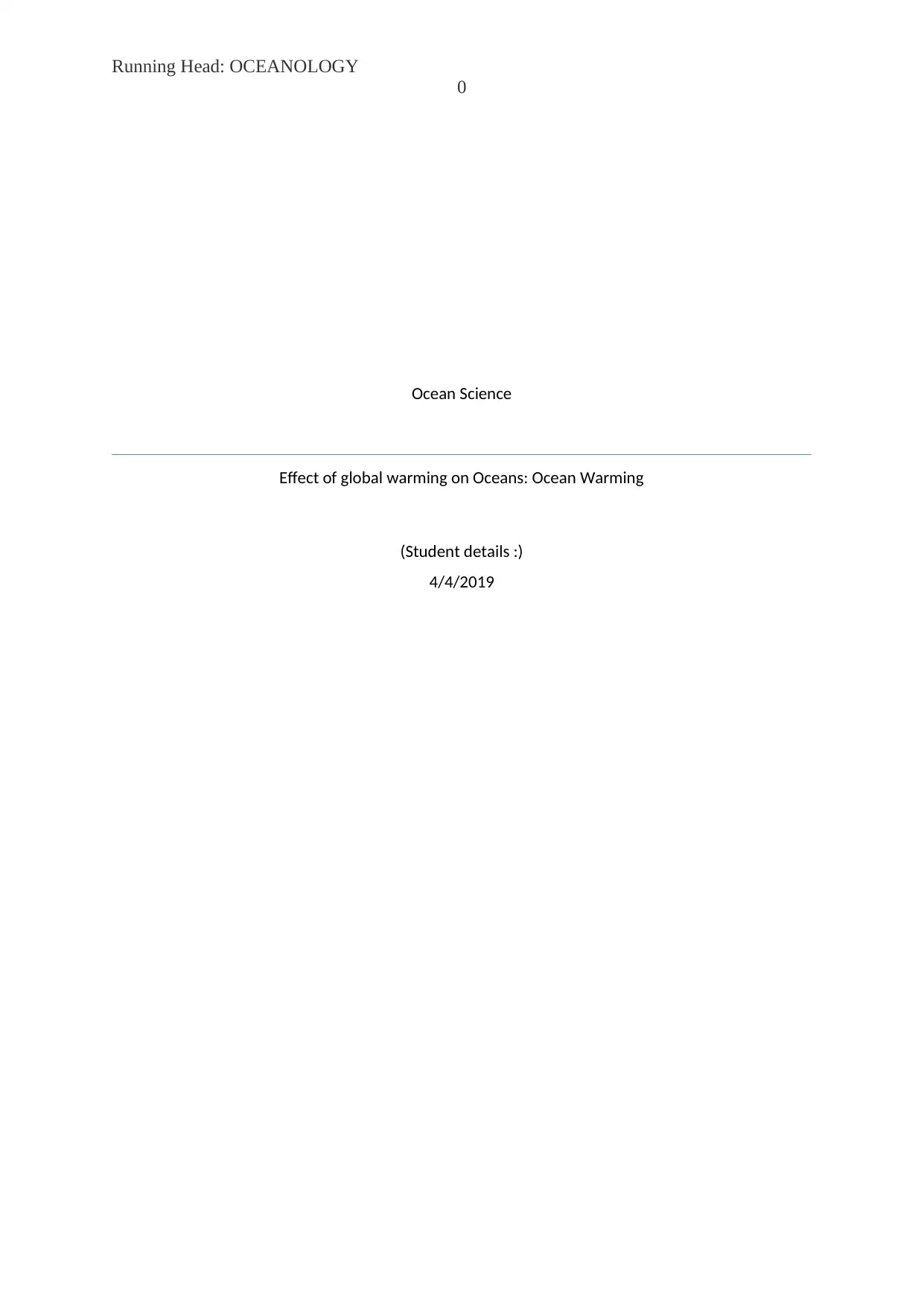
Running Head: OCEANOLOGY
0
Ocean Science
Effect of global warming on Oceans: Ocean Warming
(Student details :)
4/4/2019
0
Ocean Science
Effect of global warming on Oceans: Ocean Warming
(Student details :)
4/4/2019
Paraphrase This Document
Need a fresh take? Get an instant paraphrase of this document with our AI Paraphraser
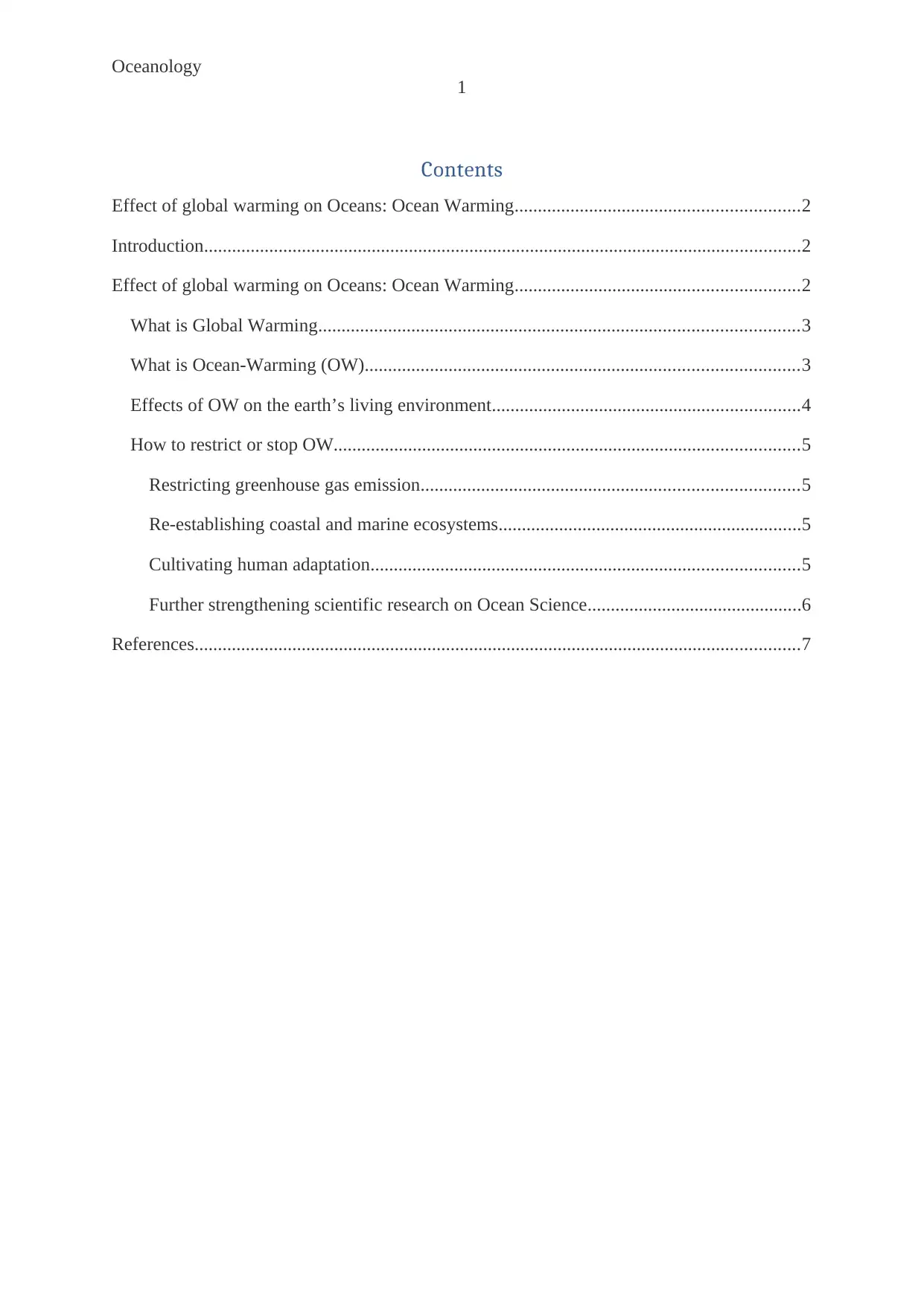
Oceanology
1
Contents
Effect of global warming on Oceans: Ocean Warming.............................................................2
Introduction................................................................................................................................2
Effect of global warming on Oceans: Ocean Warming.............................................................2
What is Global Warming.......................................................................................................3
What is Ocean-Warming (OW).............................................................................................3
Effects of OW on the earth’s living environment..................................................................4
How to restrict or stop OW....................................................................................................5
Restricting greenhouse gas emission.................................................................................5
Re-establishing coastal and marine ecosystems.................................................................5
Cultivating human adaptation............................................................................................5
Further strengthening scientific research on Ocean Science..............................................6
References..................................................................................................................................7
1
Contents
Effect of global warming on Oceans: Ocean Warming.............................................................2
Introduction................................................................................................................................2
Effect of global warming on Oceans: Ocean Warming.............................................................2
What is Global Warming.......................................................................................................3
What is Ocean-Warming (OW).............................................................................................3
Effects of OW on the earth’s living environment..................................................................4
How to restrict or stop OW....................................................................................................5
Restricting greenhouse gas emission.................................................................................5
Re-establishing coastal and marine ecosystems.................................................................5
Cultivating human adaptation............................................................................................5
Further strengthening scientific research on Ocean Science..............................................6
References..................................................................................................................................7
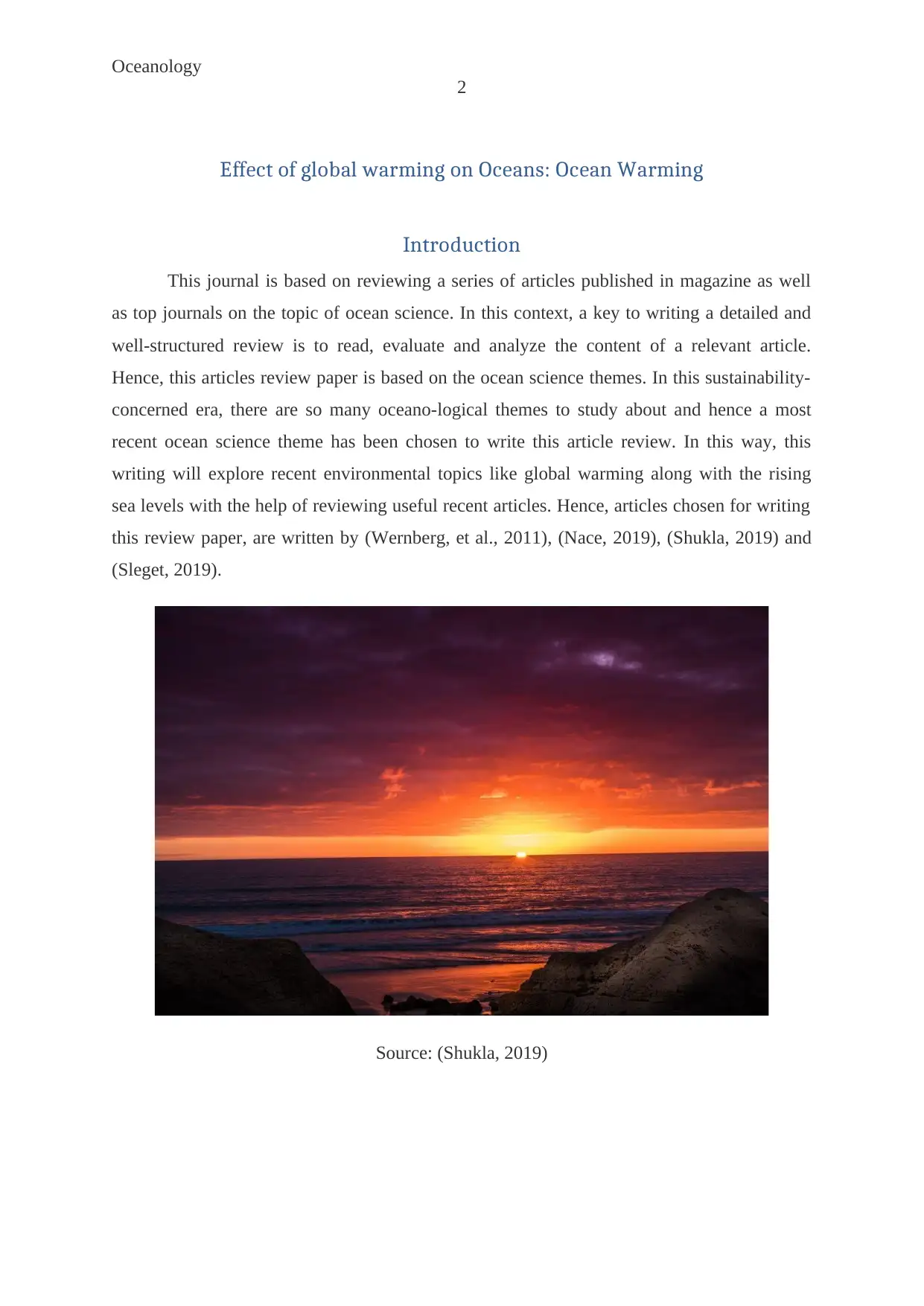
Oceanology
2
Effect of global warming on Oceans: Ocean Warming
Introduction
This journal is based on reviewing a series of articles published in magazine as well
as top journals on the topic of ocean science. In this context, a key to writing a detailed and
well-structured review is to read, evaluate and analyze the content of a relevant article.
Hence, this articles review paper is based on the ocean science themes. In this sustainability-
concerned era, there are so many oceano-logical themes to study about and hence a most
recent ocean science theme has been chosen to write this article review. In this way, this
writing will explore recent environmental topics like global warming along with the rising
sea levels with the help of reviewing useful recent articles. Hence, articles chosen for writing
this review paper, are written by (Wernberg, et al., 2011), (Nace, 2019), (Shukla, 2019) and
(Sleget, 2019).
Source: (Shukla, 2019)
2
Effect of global warming on Oceans: Ocean Warming
Introduction
This journal is based on reviewing a series of articles published in magazine as well
as top journals on the topic of ocean science. In this context, a key to writing a detailed and
well-structured review is to read, evaluate and analyze the content of a relevant article.
Hence, this articles review paper is based on the ocean science themes. In this sustainability-
concerned era, there are so many oceano-logical themes to study about and hence a most
recent ocean science theme has been chosen to write this article review. In this way, this
writing will explore recent environmental topics like global warming along with the rising
sea levels with the help of reviewing useful recent articles. Hence, articles chosen for writing
this review paper, are written by (Wernberg, et al., 2011), (Nace, 2019), (Shukla, 2019) and
(Sleget, 2019).
Source: (Shukla, 2019)
⊘ This is a preview!⊘
Do you want full access?
Subscribe today to unlock all pages.

Trusted by 1+ million students worldwide
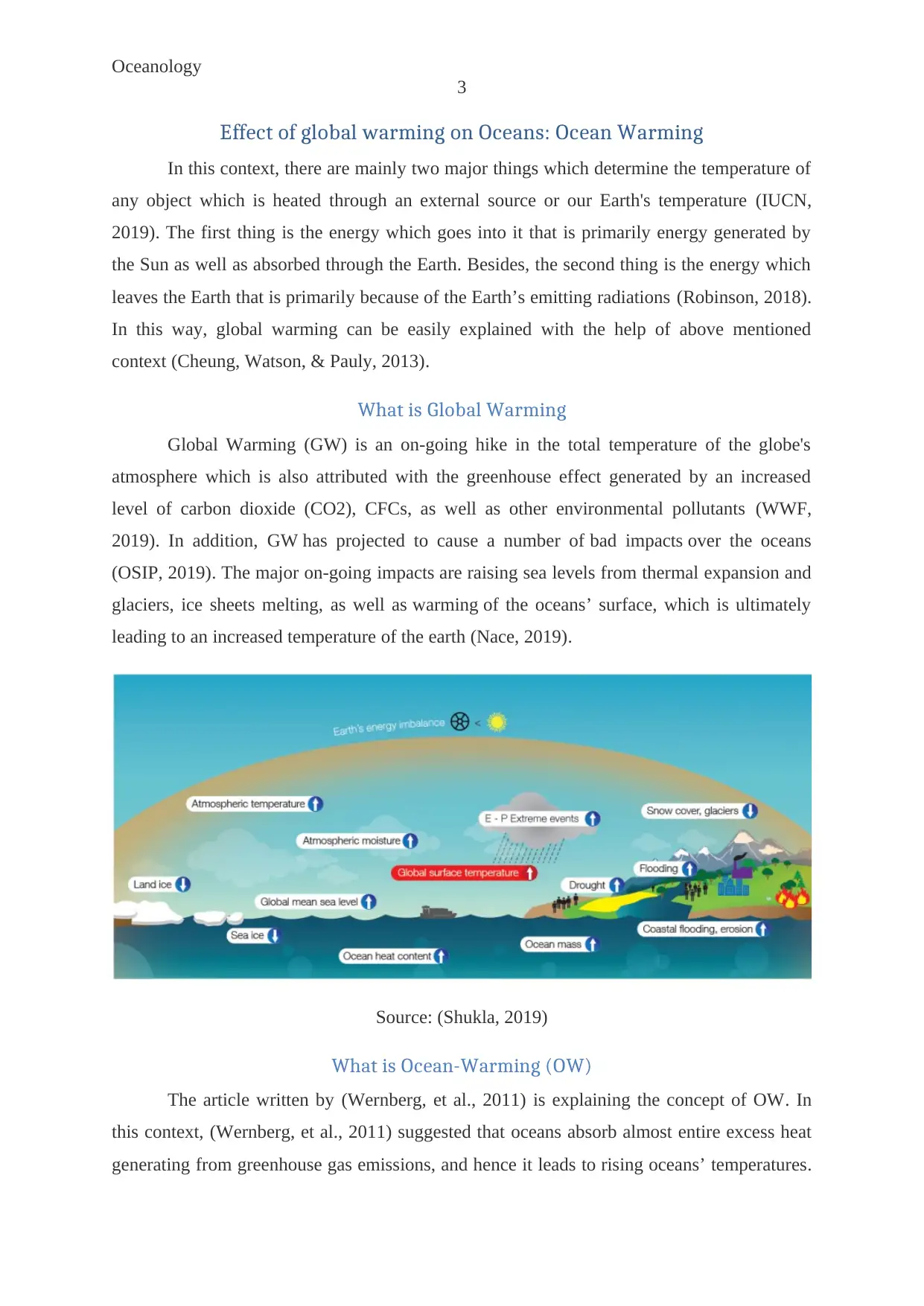
Oceanology
3
Effect of global warming on Oceans: Ocean Warming
In this context, there are mainly two major things which determine the temperature of
any object which is heated through an external source or our Earth's temperature (IUCN,
2019). The first thing is the energy which goes into it that is primarily energy generated by
the Sun as well as absorbed through the Earth. Besides, the second thing is the energy which
leaves the Earth that is primarily because of the Earth’s emitting radiations (Robinson, 2018).
In this way, global warming can be easily explained with the help of above mentioned
context (Cheung, Watson, & Pauly, 2013).
What is Global Warming
Global Warming (GW) is an on-going hike in the total temperature of the globe's
atmosphere which is also attributed with the greenhouse effect generated by an increased
level of carbon dioxide (CO2), CFCs, as well as other environmental pollutants (WWF,
2019). In addition, GW has projected to cause a number of bad impacts over the oceans
(OSIP, 2019). The major on-going impacts are raising sea levels from thermal expansion and
glaciers, ice sheets melting, as well as warming of the oceans’ surface, which is ultimately
leading to an increased temperature of the earth (Nace, 2019).
Source: (Shukla, 2019)
What is Ocean-Warming (OW)
The article written by (Wernberg, et al., 2011) is explaining the concept of OW. In
this context, (Wernberg, et al., 2011) suggested that oceans absorb almost entire excess heat
generating from greenhouse gas emissions, and hence it leads to rising oceans’ temperatures.
3
Effect of global warming on Oceans: Ocean Warming
In this context, there are mainly two major things which determine the temperature of
any object which is heated through an external source or our Earth's temperature (IUCN,
2019). The first thing is the energy which goes into it that is primarily energy generated by
the Sun as well as absorbed through the Earth. Besides, the second thing is the energy which
leaves the Earth that is primarily because of the Earth’s emitting radiations (Robinson, 2018).
In this way, global warming can be easily explained with the help of above mentioned
context (Cheung, Watson, & Pauly, 2013).
What is Global Warming
Global Warming (GW) is an on-going hike in the total temperature of the globe's
atmosphere which is also attributed with the greenhouse effect generated by an increased
level of carbon dioxide (CO2), CFCs, as well as other environmental pollutants (WWF,
2019). In addition, GW has projected to cause a number of bad impacts over the oceans
(OSIP, 2019). The major on-going impacts are raising sea levels from thermal expansion and
glaciers, ice sheets melting, as well as warming of the oceans’ surface, which is ultimately
leading to an increased temperature of the earth (Nace, 2019).
Source: (Shukla, 2019)
What is Ocean-Warming (OW)
The article written by (Wernberg, et al., 2011) is explaining the concept of OW. In
this context, (Wernberg, et al., 2011) suggested that oceans absorb almost entire excess heat
generating from greenhouse gas emissions, and hence it leads to rising oceans’ temperatures.
Paraphrase This Document
Need a fresh take? Get an instant paraphrase of this document with our AI Paraphraser
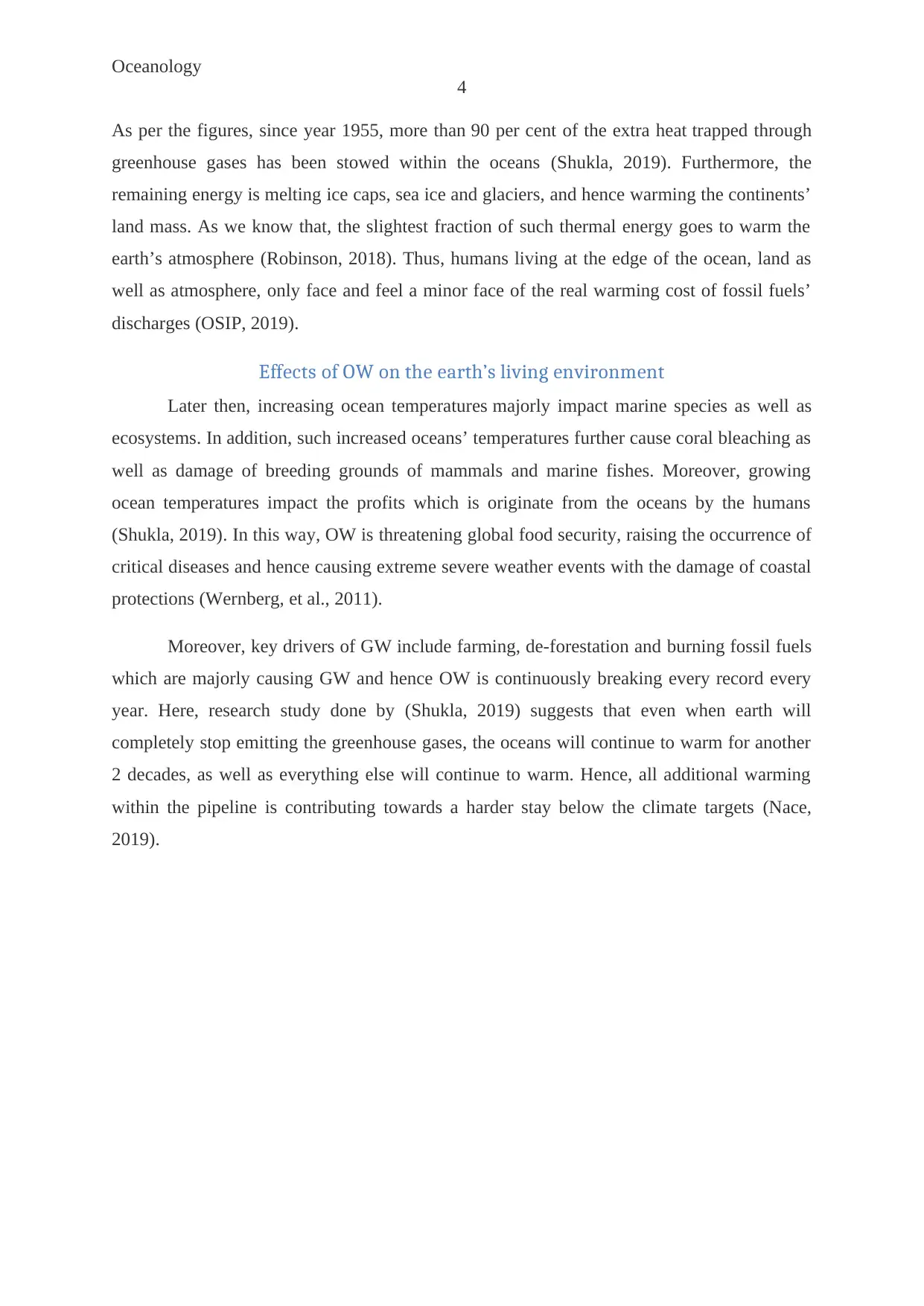
Oceanology
4
As per the figures, since year 1955, more than 90 per cent of the extra heat trapped through
greenhouse gases has been stowed within the oceans (Shukla, 2019). Furthermore, the
remaining energy is melting ice caps, sea ice and glaciers, and hence warming the continents’
land mass. As we know that, the slightest fraction of such thermal energy goes to warm the
earth’s atmosphere (Robinson, 2018). Thus, humans living at the edge of the ocean, land as
well as atmosphere, only face and feel a minor face of the real warming cost of fossil fuels’
discharges (OSIP, 2019).
Effects of OW on the earth’s living environment
Later then, increasing ocean temperatures majorly impact marine species as well as
ecosystems. In addition, such increased oceans’ temperatures further cause coral bleaching as
well as damage of breeding grounds of mammals and marine fishes. Moreover, growing
ocean temperatures impact the profits which is originate from the oceans by the humans
(Shukla, 2019). In this way, OW is threatening global food security, raising the occurrence of
critical diseases and hence causing extreme severe weather events with the damage of coastal
protections (Wernberg, et al., 2011).
Moreover, key drivers of GW include farming, de-forestation and burning fossil fuels
which are majorly causing GW and hence OW is continuously breaking every record every
year. Here, research study done by (Shukla, 2019) suggests that even when earth will
completely stop emitting the greenhouse gases, the oceans will continue to warm for another
2 decades, as well as everything else will continue to warm. Hence, all additional warming
within the pipeline is contributing towards a harder stay below the climate targets (Nace,
2019).
4
As per the figures, since year 1955, more than 90 per cent of the extra heat trapped through
greenhouse gases has been stowed within the oceans (Shukla, 2019). Furthermore, the
remaining energy is melting ice caps, sea ice and glaciers, and hence warming the continents’
land mass. As we know that, the slightest fraction of such thermal energy goes to warm the
earth’s atmosphere (Robinson, 2018). Thus, humans living at the edge of the ocean, land as
well as atmosphere, only face and feel a minor face of the real warming cost of fossil fuels’
discharges (OSIP, 2019).
Effects of OW on the earth’s living environment
Later then, increasing ocean temperatures majorly impact marine species as well as
ecosystems. In addition, such increased oceans’ temperatures further cause coral bleaching as
well as damage of breeding grounds of mammals and marine fishes. Moreover, growing
ocean temperatures impact the profits which is originate from the oceans by the humans
(Shukla, 2019). In this way, OW is threatening global food security, raising the occurrence of
critical diseases and hence causing extreme severe weather events with the damage of coastal
protections (Wernberg, et al., 2011).
Moreover, key drivers of GW include farming, de-forestation and burning fossil fuels
which are majorly causing GW and hence OW is continuously breaking every record every
year. Here, research study done by (Shukla, 2019) suggests that even when earth will
completely stop emitting the greenhouse gases, the oceans will continue to warm for another
2 decades, as well as everything else will continue to warm. Hence, all additional warming
within the pipeline is contributing towards a harder stay below the climate targets (Nace,
2019).
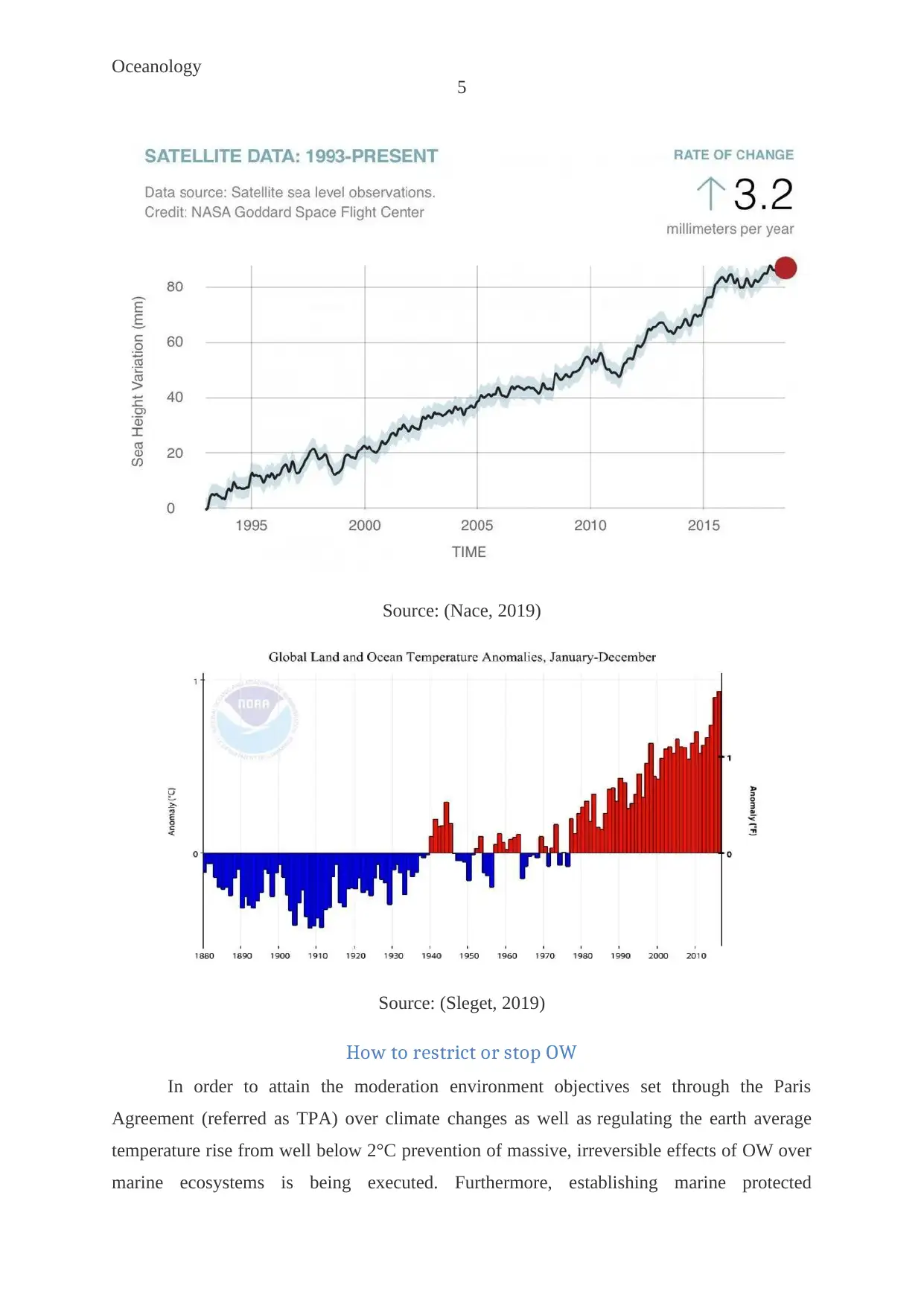
Oceanology
5
Source: (Nace, 2019)
Source: (Sleget, 2019)
How to restrict or stop OW
In order to attain the moderation environment objectives set through the Paris
Agreement (referred as TPA) over climate changes as well as regulating the earth average
temperature rise from well below 2°C prevention of massive, irreversible effects of OW over
marine ecosystems is being executed. Furthermore, establishing marine protected
5
Source: (Nace, 2019)
Source: (Sleget, 2019)
How to restrict or stop OW
In order to attain the moderation environment objectives set through the Paris
Agreement (referred as TPA) over climate changes as well as regulating the earth average
temperature rise from well below 2°C prevention of massive, irreversible effects of OW over
marine ecosystems is being executed. Furthermore, establishing marine protected
⊘ This is a preview!⊘
Do you want full access?
Subscribe today to unlock all pages.

Trusted by 1+ million students worldwide
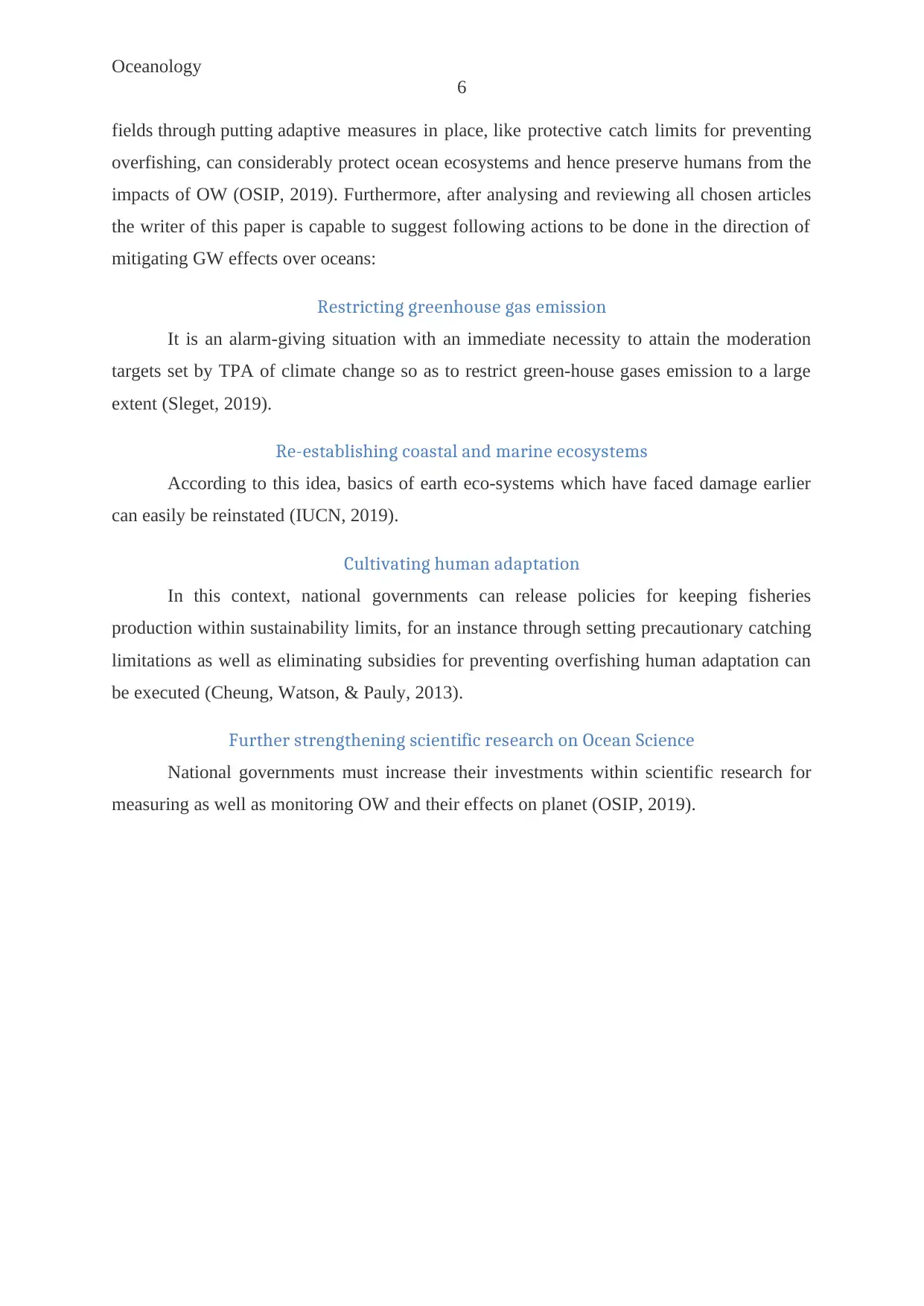
Oceanology
6
fields through putting adaptive measures in place, like protective catch limits for preventing
overfishing, can considerably protect ocean ecosystems and hence preserve humans from the
impacts of OW (OSIP, 2019). Furthermore, after analysing and reviewing all chosen articles
the writer of this paper is capable to suggest following actions to be done in the direction of
mitigating GW effects over oceans:
Restricting greenhouse gas emission
It is an alarm-giving situation with an immediate necessity to attain the moderation
targets set by TPA of climate change so as to restrict green-house gases emission to a large
extent (Sleget, 2019).
Re-establishing coastal and marine ecosystems
According to this idea, basics of earth eco-systems which have faced damage earlier
can easily be reinstated (IUCN, 2019).
Cultivating human adaptation
In this context, national governments can release policies for keeping fisheries
production within sustainability limits, for an instance through setting precautionary catching
limitations as well as eliminating subsidies for preventing overfishing human adaptation can
be executed (Cheung, Watson, & Pauly, 2013).
Further strengthening scientific research on Ocean Science
National governments must increase their investments within scientific research for
measuring as well as monitoring OW and their effects on planet (OSIP, 2019).
6
fields through putting adaptive measures in place, like protective catch limits for preventing
overfishing, can considerably protect ocean ecosystems and hence preserve humans from the
impacts of OW (OSIP, 2019). Furthermore, after analysing and reviewing all chosen articles
the writer of this paper is capable to suggest following actions to be done in the direction of
mitigating GW effects over oceans:
Restricting greenhouse gas emission
It is an alarm-giving situation with an immediate necessity to attain the moderation
targets set by TPA of climate change so as to restrict green-house gases emission to a large
extent (Sleget, 2019).
Re-establishing coastal and marine ecosystems
According to this idea, basics of earth eco-systems which have faced damage earlier
can easily be reinstated (IUCN, 2019).
Cultivating human adaptation
In this context, national governments can release policies for keeping fisheries
production within sustainability limits, for an instance through setting precautionary catching
limitations as well as eliminating subsidies for preventing overfishing human adaptation can
be executed (Cheung, Watson, & Pauly, 2013).
Further strengthening scientific research on Ocean Science
National governments must increase their investments within scientific research for
measuring as well as monitoring OW and their effects on planet (OSIP, 2019).
Paraphrase This Document
Need a fresh take? Get an instant paraphrase of this document with our AI Paraphraser
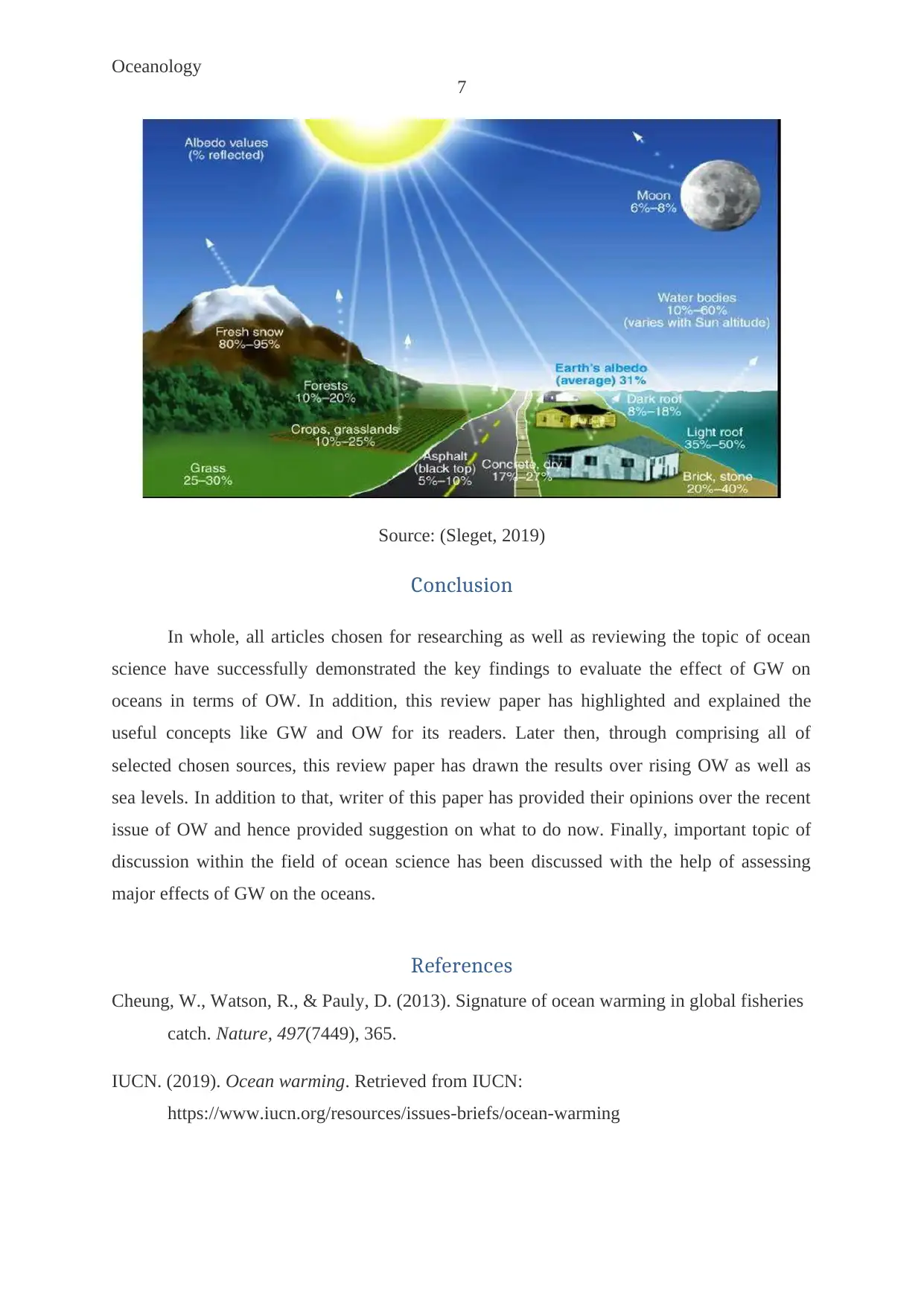
Oceanology
7
Source: (Sleget, 2019)
Conclusion
In whole, all articles chosen for researching as well as reviewing the topic of ocean
science have successfully demonstrated the key findings to evaluate the effect of GW on
oceans in terms of OW. In addition, this review paper has highlighted and explained the
useful concepts like GW and OW for its readers. Later then, through comprising all of
selected chosen sources, this review paper has drawn the results over rising OW as well as
sea levels. In addition to that, writer of this paper has provided their opinions over the recent
issue of OW and hence provided suggestion on what to do now. Finally, important topic of
discussion within the field of ocean science has been discussed with the help of assessing
major effects of GW on the oceans.
References
Cheung, W., Watson, R., & Pauly, D. (2013). Signature of ocean warming in global fisheries
catch. Nature, 497(7449), 365.
IUCN. (2019). Ocean warming. Retrieved from IUCN:
https://www.iucn.org/resources/issues-briefs/ocean-warming
7
Source: (Sleget, 2019)
Conclusion
In whole, all articles chosen for researching as well as reviewing the topic of ocean
science have successfully demonstrated the key findings to evaluate the effect of GW on
oceans in terms of OW. In addition, this review paper has highlighted and explained the
useful concepts like GW and OW for its readers. Later then, through comprising all of
selected chosen sources, this review paper has drawn the results over rising OW as well as
sea levels. In addition to that, writer of this paper has provided their opinions over the recent
issue of OW and hence provided suggestion on what to do now. Finally, important topic of
discussion within the field of ocean science has been discussed with the help of assessing
major effects of GW on the oceans.
References
Cheung, W., Watson, R., & Pauly, D. (2013). Signature of ocean warming in global fisheries
catch. Nature, 497(7449), 365.
IUCN. (2019). Ocean warming. Retrieved from IUCN:
https://www.iucn.org/resources/issues-briefs/ocean-warming
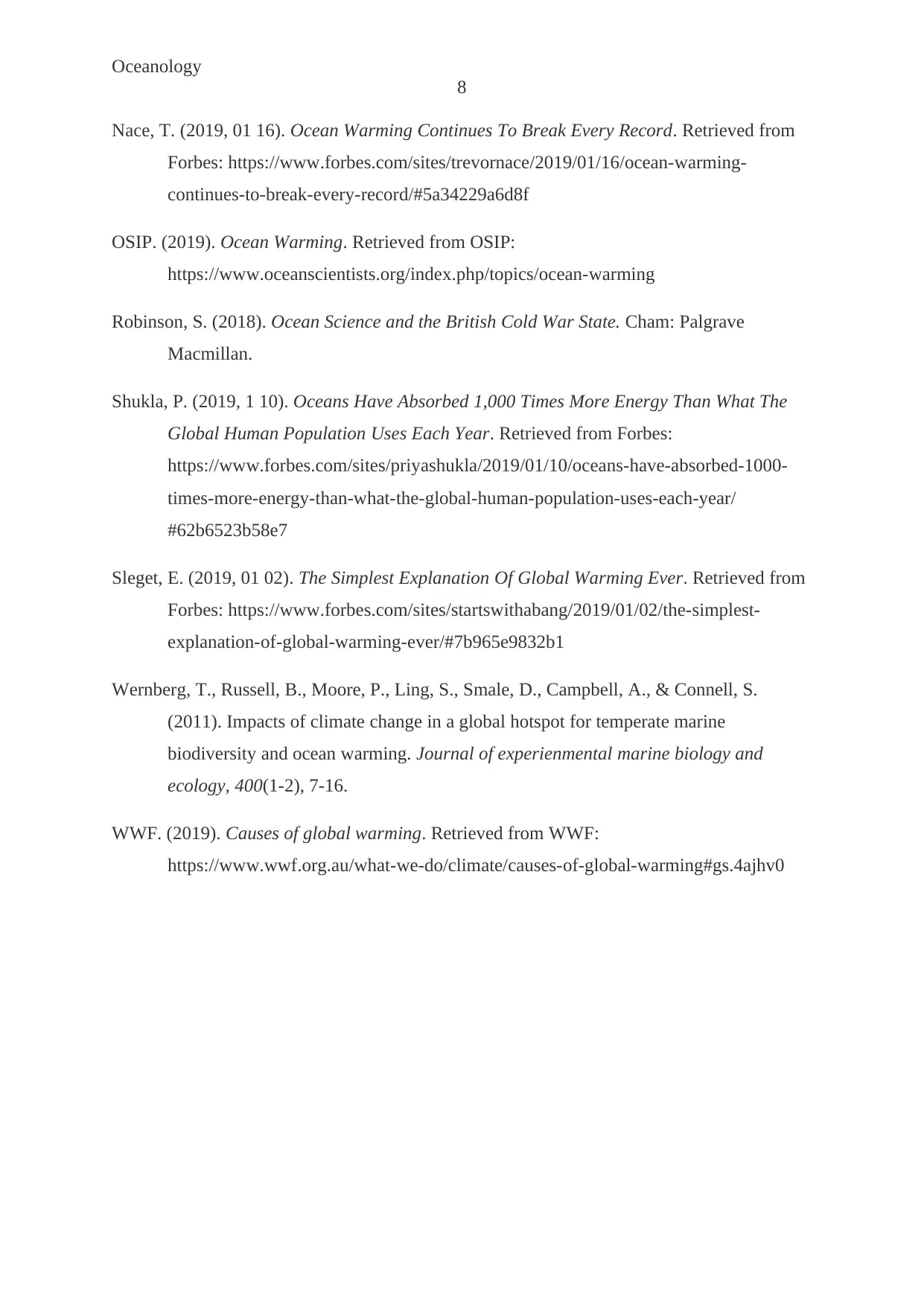
Oceanology
8
Nace, T. (2019, 01 16). Ocean Warming Continues To Break Every Record. Retrieved from
Forbes: https://www.forbes.com/sites/trevornace/2019/01/16/ocean-warming-
continues-to-break-every-record/#5a34229a6d8f
OSIP. (2019). Ocean Warming. Retrieved from OSIP:
https://www.oceanscientists.org/index.php/topics/ocean-warming
Robinson, S. (2018). Ocean Science and the British Cold War State. Cham: Palgrave
Macmillan.
Shukla, P. (2019, 1 10). Oceans Have Absorbed 1,000 Times More Energy Than What The
Global Human Population Uses Each Year. Retrieved from Forbes:
https://www.forbes.com/sites/priyashukla/2019/01/10/oceans-have-absorbed-1000-
times-more-energy-than-what-the-global-human-population-uses-each-year/
#62b6523b58e7
Sleget, E. (2019, 01 02). The Simplest Explanation Of Global Warming Ever. Retrieved from
Forbes: https://www.forbes.com/sites/startswithabang/2019/01/02/the-simplest-
explanation-of-global-warming-ever/#7b965e9832b1
Wernberg, T., Russell, B., Moore, P., Ling, S., Smale, D., Campbell, A., & Connell, S.
(2011). Impacts of climate change in a global hotspot for temperate marine
biodiversity and ocean warming. Journal of experienmental marine biology and
ecology, 400(1-2), 7-16.
WWF. (2019). Causes of global warming. Retrieved from WWF:
https://www.wwf.org.au/what-we-do/climate/causes-of-global-warming#gs.4ajhv0
8
Nace, T. (2019, 01 16). Ocean Warming Continues To Break Every Record. Retrieved from
Forbes: https://www.forbes.com/sites/trevornace/2019/01/16/ocean-warming-
continues-to-break-every-record/#5a34229a6d8f
OSIP. (2019). Ocean Warming. Retrieved from OSIP:
https://www.oceanscientists.org/index.php/topics/ocean-warming
Robinson, S. (2018). Ocean Science and the British Cold War State. Cham: Palgrave
Macmillan.
Shukla, P. (2019, 1 10). Oceans Have Absorbed 1,000 Times More Energy Than What The
Global Human Population Uses Each Year. Retrieved from Forbes:
https://www.forbes.com/sites/priyashukla/2019/01/10/oceans-have-absorbed-1000-
times-more-energy-than-what-the-global-human-population-uses-each-year/
#62b6523b58e7
Sleget, E. (2019, 01 02). The Simplest Explanation Of Global Warming Ever. Retrieved from
Forbes: https://www.forbes.com/sites/startswithabang/2019/01/02/the-simplest-
explanation-of-global-warming-ever/#7b965e9832b1
Wernberg, T., Russell, B., Moore, P., Ling, S., Smale, D., Campbell, A., & Connell, S.
(2011). Impacts of climate change in a global hotspot for temperate marine
biodiversity and ocean warming. Journal of experienmental marine biology and
ecology, 400(1-2), 7-16.
WWF. (2019). Causes of global warming. Retrieved from WWF:
https://www.wwf.org.au/what-we-do/climate/causes-of-global-warming#gs.4ajhv0
⊘ This is a preview!⊘
Do you want full access?
Subscribe today to unlock all pages.

Trusted by 1+ million students worldwide
1 out of 9
Related Documents
Your All-in-One AI-Powered Toolkit for Academic Success.
+13062052269
info@desklib.com
Available 24*7 on WhatsApp / Email
![[object Object]](/_next/static/media/star-bottom.7253800d.svg)
Unlock your academic potential
Copyright © 2020–2026 A2Z Services. All Rights Reserved. Developed and managed by ZUCOL.





